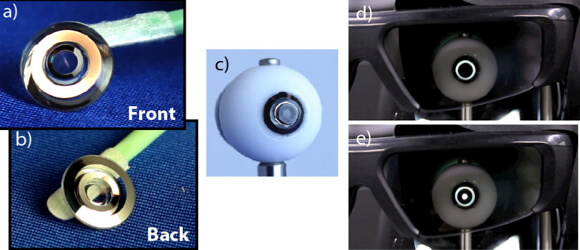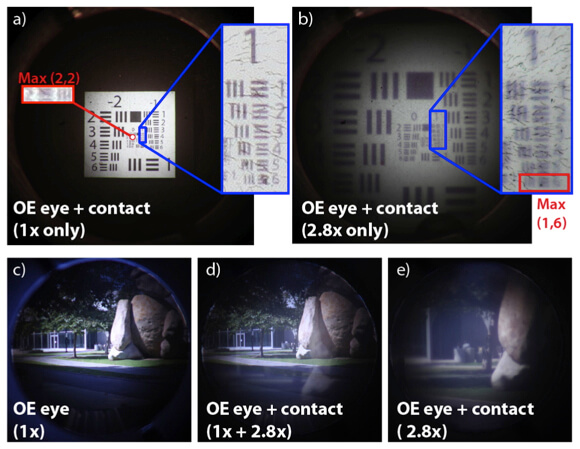New Telescopic Contact Lens Magnifies Vision Three Times
Researchers led by Eric Tremblay from the École Polytechnique Fédérale de Lausanne (EDFL) in Switzerland and Joseph Ford from UC San Diego have developed a new ‘Superman-style contact lens that can magnify the wearer’s vision by 2.8 times when worn with a modified pair of 3D glasses. These contacts may one day empower those suffering from macular degeneration or even augmenting the eyes of those with perfectly healthy vision.

Share
Researchers led by Eric Tremblay from the École Polytechnique Fédérale de Lausanne (EDFL) in Switzerland and Joseph Ford from UC San Diego have developed a new Superman-style contact lens that can magnify the wearer’s vision by 2.8 times when worn with a modified pair of 3D glasses.
Such contacts may one day empower those suffering from macular degeneration or even augment the eyes of those with perfectly healthy vision.
How do they work? The center of the lens allows light directly through for normal vision. Meanwhile, a 1.17 mm thick magnifying ring, located around the lens center and comprised of tiny aluminum mirrors, reflects incoming light from objects into the wearer’s retina, at which point, the image has been magnified almost three times.
One very cool thing about this lens is the selective magnification. The researchers used a pair of modified polarized Samsung 3D TV glasses to switch between normal (light through the central lens aperture) and magnified views (where the polarizing filters block the central lens and admit light from the mirrors).
This technology may help the approximately two million people in the US suffering from macular degeneration—the most common cause of blindness for individuals aged over 55 years. The macula of the eye, which deals with the visual details, slowly degenerates resulting in vision loss from the center field of vision, and the sufferer cannot recognize faces or perform simple tasks.
Be Part of the Future
Sign up to receive top stories about groundbreaking technologies and visionary thinkers from SingularityHub.


The current treatments for macular degeneration include invasive surgery or to wear glasses with very thick lenses. Although research continues, development of this new magnifying lens technology has the potential to improve the quality of life for millions of people around the world by using these ‘normal’ looking lenses.
Further applications might include military use to increase soldiers’ vision. (The research was originally funded by DARPA.) But there’s no reason to stop there. We could imagine a pair of these lenses being fun or useful for just about anyone. And perhaps telescopic powers are but one attribute of future contact lenses—others may include filters to see outside our normal band of the spectrum, tiny cameras, and augmented reality.
That said, in the foreseeable future, we’ll have to be content with just dreams of switchable x-ray contacts with telescoping lenses and onboard computers.
The project remains firmly in the research stage. The image quality isn’t perfect, the lenses need to be more breathable, the switchable glasses lack blink detectors, and above all, the contacts have yet to be tested on human subjects.
The research team is currently working with Paragon Vision Sciences and Innovega to improve lens flexibility and eye oxygenation to increase the amount of time that the lenses can be worn. According to Eric Tramblay, the next generation of lenses to be used in clinical trials is expected in November 2013.
Image Credit: Maikel Nai/Flickr (featured, banner). Body images of telescopic contact lens reproduced with permission from Optics Express 21, pp. 15980-15986, © 2013 OSA.
Dr. Ian Anglin obtained his Ph.D. in molecular pathology from the University of Wales, College of Medicine in the United Kingdom. While writing his thesis entitled ‘Identification of Differential Gene Expression During Prostate Cancer Progression’ he contributed to a paper published in the International Journal of Cancer. Subsequently, Dr. Anglin pursued postdoctoral work at the University of Maryland, School of Medicine, Baltimore in various research departments including the Division of Urology, the Greenebaum Cancer Research Center and at the BioPark Center for Vascular and Inflammatory Diseases. During his 10 years there, he mentored students, contributed to NIH grants, presented data at various scientific meetings, was awarded an AFUD scholarship and won a Gordon Research Conference Travel scholarship. He has published in Cancer Research, Prostate Cancer and Prostatic Diseases, British Journal of Cancer and a book chapter in ‘Molecular Targeting and Signal Transduction’ edited by Dr. Rakesh Kumar. Dr. Anglin currently resides in Baltimore MD where he is working as a freelance scientific editor for various online companies providing substantive and copyediting services.
Related Articles

These Supercharged Immune Cells Completely Eliminated Solid Tumors in Mice

New Device Detects Brain Waves in Mini Brains Mimicking Early Human Development

This Week’s Awesome Tech Stories From Around the Web (Through February 28)
What we’re reading


